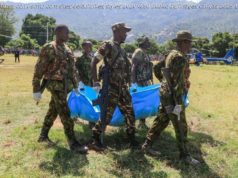Trump still needs to get permission from Congress to wage war against Islamic State.
Almost three years after former President Barack Obama promised to “degrade and ultimately destroy” Islamic State, the terrorist group is reeling. It has been driven from the city of Mosul in Iraq. And Raqqah, the Syrian city that serves as the capital of its so-called Caliphate, is under siege.
But depriving Islamic State of its territory won’ t extinguish the movement or its capacity to plan or inspire acts of violence. The Combating Terrorism Center at West Point reported last month that as of April, Islamic State fighters had launched 1,468 attacks in 16 cities that had been wrested from its control, resulting in nearly 2,600 deaths. More than 100 of those attacks occurred in the western sector of Mosul after that part of the city was recaptured.
Much as Americans might hope that the U. S. can simply declare victory and turn its attention elsewhere, the reality is that preventing Islamic State from surviving and thriving in the future will require continued diplomatic, economic and, yes, military engagement by the United States. But it will also require something that has been missing since Obama launched this campaign: congressional approval.
Islamic State, which shocked the world with its beheadings of journalists and aid workers, was previously the Iraqi affiliate of Al Qaeda. It was able to consolidate power in Iraq because of the disaffection of Sunni citizens with the Shia-dominated government that took power after the fall of Saddam Hussein — a government that became even less inclusive with the withdrawal of the last U. S. military forces at the end of 2011.
Obama, who presided over that withdrawal and who announced in 2011 that « the tide of war is receding, ” to his credit recognized three years later that Islamic State, if left unchecked, “could pose a growing threat beyond that region — including to the United States.” Obama was struck not only by the group’s brutality but also by the fact that it had recruited so many Europeans and Americans who could return home to commit deadly attacks. So a president who had prided himself on extricating the U. S. from foreign military entanglements ended his term by returning U. S. forces to Iraq — although the 5,000 trainers, advisers and special forces were a small fraction of the peak U. S. troop level of 170,000. Obama also ordered airstrikes on Islamic State positions in both Syria and Iraq.
Despite suggesting during his campaign that he had his own plan for defeating Islamic State, Trump has so far pursued a strategy in Iraq strikingly similar to Obama’s — relying heavily on air power but rationing the use of U. S. military personnel on the ground. U. S. troops have functioned primarily as trainers and advisers. The brunt of fighting in Iraq has been borne by local forces. They include the elite, multi-sectarian, U. S.-trained Counter-Terrorism Service whose troops were involved in the recapture of Mosul, but also a Shia militia allied with Iran.
Secretary of Defense James N. Mattis believes that the U. S. should retain a military presence in Iraq. That makes sense for political as well as military reasons and could help in the continuing effort to urge Iraq’s leadership to govern in an inclusive way. (In Syria, the Trump administration long has made it clear that its priority is the defeat of Islamic State, rather than the early ouster of President Bashar Assad. On Wednesday the Washington Post reported that the administration had decided to end a troubled CIA training program for anti-Assad opposition groups.)
This page has long argued that the war against Islamic State — both the air campaign and the deployment of troops, even if they are not technically in a combat role — requires explicit authorization by Congress. The Obama administration sought such approval, but undermined the urgency of its own request by insisting that it already possessed adequate authority under two existing congressional Authorizations for Use of Military Force. The first, approved in 2001, was aimed at the perpetrators of 9/11. The other, from 2002, was designed to deal with « the continuing threat posed by Iraq » — the Iraq of Saddam Hussein.
Both of those resolutions addressed situations distant in time and different in context from the threat posed by Islamic State. If, as seems likely, the war against Islamic State is still to be won, Congress must act and not just acquiesce.






